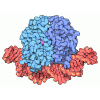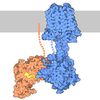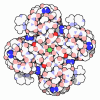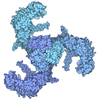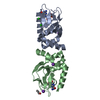[English] 日本語
 Yorodumi
Yorodumi- PDB-6i9d: MloK1 consensus structure from single particle analysis of 2D crystals -
+ Open data
Open data
- Basic information
Basic information
| Entry | Database: PDB / ID: 6i9d | ||||||
|---|---|---|---|---|---|---|---|
| Title | MloK1 consensus structure from single particle analysis of 2D crystals | ||||||
 Components Components | Cyclic nucleotide-gated potassium channel mll3241 | ||||||
 Keywords Keywords | MEMBRANE PROTEIN / Voltage-gated potassium channel / Cyclic nucleotide-binding domain / ion channel / ion transport | ||||||
| Function / homology |  Function and homology information Function and homology informationintracellularly cyclic nucleotide-activated monoatomic cation channel activity / potassium channel activity / cAMP binding / protein-containing complex binding / identical protein binding / plasma membrane Similarity search - Function | ||||||
| Biological species | Mesorhizobium japonicum | ||||||
| Method | ELECTRON MICROSCOPY / single particle reconstruction / cryo EM / Resolution: 4 Å | ||||||
 Authors Authors | Righetto, R. / Biyani, N. / Kowal, J. / Chami, M. / Stahlberg, H. | ||||||
| Funding support |  Switzerland, 1items Switzerland, 1items
| ||||||
 Citation Citation |  Journal: Nat Commun / Year: 2019 Journal: Nat Commun / Year: 2019Title: Retrieving high-resolution information from disordered 2D crystals by single-particle cryo-EM. Authors: Ricardo D Righetto / Nikhil Biyani / Julia Kowal / Mohamed Chami / Henning Stahlberg /  Abstract: Electron crystallography can reveal the structure of membrane proteins within 2D crystals under close-to-native conditions. High-resolution structural information can only be reached if crystals are ...Electron crystallography can reveal the structure of membrane proteins within 2D crystals under close-to-native conditions. High-resolution structural information can only be reached if crystals are perfectly flat and highly ordered. In practice, such crystals are difficult to obtain. Available image unbending algorithms correct for disorder, but only perform well on images of non-tilted, flat crystals, while out-of-plane distortions are not addressed. Here, we present an approach that employs single-particle refinement procedures to locally unbend crystals in 3D. With this method, density maps of the MloK1 potassium channel with a resolution of 4 Å were obtained from images of 2D crystals that do not diffract beyond 10 Å. Furthermore, 3D classification allowed multiple structures to be resolved, revealing a series of MloK1 conformations within a single 2D crystal. This conformational heterogeneity explains the poor diffraction observed and is related to channel function. The approach is implemented in the FOCUS package. | ||||||
| History |
|
- Structure visualization
Structure visualization
| Movie |
 Movie viewer Movie viewer |
|---|---|
| Structure viewer | Molecule:  Molmil Molmil Jmol/JSmol Jmol/JSmol |
- Downloads & links
Downloads & links
- Download
Download
| PDBx/mmCIF format |  6i9d.cif.gz 6i9d.cif.gz | 446.3 KB | Display |  PDBx/mmCIF format PDBx/mmCIF format |
|---|---|---|---|---|
| PDB format |  pdb6i9d.ent.gz pdb6i9d.ent.gz | 374.9 KB | Display |  PDB format PDB format |
| PDBx/mmJSON format |  6i9d.json.gz 6i9d.json.gz | Tree view |  PDBx/mmJSON format PDBx/mmJSON format | |
| Others |  Other downloads Other downloads |
-Validation report
| Summary document |  6i9d_validation.pdf.gz 6i9d_validation.pdf.gz | 1.2 MB | Display |  wwPDB validaton report wwPDB validaton report |
|---|---|---|---|---|
| Full document |  6i9d_full_validation.pdf.gz 6i9d_full_validation.pdf.gz | 1.2 MB | Display | |
| Data in XML |  6i9d_validation.xml.gz 6i9d_validation.xml.gz | 41 KB | Display | |
| Data in CIF |  6i9d_validation.cif.gz 6i9d_validation.cif.gz | 56.6 KB | Display | |
| Arichive directory |  https://data.pdbj.org/pub/pdb/validation_reports/i9/6i9d https://data.pdbj.org/pub/pdb/validation_reports/i9/6i9d ftp://data.pdbj.org/pub/pdb/validation_reports/i9/6i9d ftp://data.pdbj.org/pub/pdb/validation_reports/i9/6i9d | HTTPS FTP |
-Related structure data
| Related structure data |  4432MC  4439C  4441C  4513C  4514C  4515C  4516C  4517C  4518C  4519C  6iaxC  6qcyC  6qczC  6qd0C  6qd1C  6qd2C  6qd3C  6qd4C C: citing same article ( M: map data used to model this data |
|---|---|
| Similar structure data | |
| EM raw data |  EMPIAR-10233 (Title: Retrieving High-Resolution Information from Disordered 2D Crystals by Single Particle Cryo-EM EMPIAR-10233 (Title: Retrieving High-Resolution Information from Disordered 2D Crystals by Single Particle Cryo-EMData size: 103.0 Data #1: Aligned averages of MloK1 2D crystals in the presence of cAMP [micrographs - single frame] Data #2: Particle stack from MloK1 2D crystals in the presence of cAMP [picked particles - single frame - unprocessed]) |
- Links
Links
- Assembly
Assembly
| Deposited unit | 
|
|---|---|
| 1 |
|
- Components
Components
| #1: Protein | Mass: 37766.297 Da / Num. of mol.: 4 Source method: isolated from a genetically manipulated source Source: (gene. exp.)  Mesorhizobium japonicum (strain LMG 29417 / CECT 9101 / MAFF 303099) (bacteria) Mesorhizobium japonicum (strain LMG 29417 / CECT 9101 / MAFF 303099) (bacteria)Strain: LMG 29417 / CECT 9101 / MAFF 303099 / Gene: mll3241 / Production host:  #2: Chemical | |
|---|
-Experimental details
-Experiment
| Experiment | Method: ELECTRON MICROSCOPY |
|---|---|
| EM experiment | Aggregation state: 2D ARRAY / 3D reconstruction method: single particle reconstruction |
- Sample preparation
Sample preparation
| Component | Name: MloK1 potassium channel in lipidic bilayer of 2D crystals Type: COMPLEX / Entity ID: #1 / Source: RECOMBINANT |
|---|---|
| Molecular weight | Value: 0.16 MDa / Experimental value: YES |
| Source (natural) | Organism:  Mesorhizobium loti MAFF303099 (bacteria) Mesorhizobium loti MAFF303099 (bacteria) |
| Source (recombinant) | Organism:  |
| Buffer solution | pH: 7.6 Details: 20 mM KCl, 20 mM Tris-HCl pH 7.6, 1 mM BaCl2, 1 mM EDTA, 0.2 mM cAMP |
| Specimen | Embedding applied: NO / Shadowing applied: NO / Staining applied: NO / Vitrification applied: YES |
| Vitrification | Cryogen name: ETHANE |
- Electron microscopy imaging
Electron microscopy imaging
| Experimental equipment |  Model: Titan Krios / Image courtesy: FEI Company |
|---|---|
| Microscopy | Model: FEI TITAN KRIOS |
| Electron gun | Electron source:  FIELD EMISSION GUN / Accelerating voltage: 300 kV / Illumination mode: OTHER FIELD EMISSION GUN / Accelerating voltage: 300 kV / Illumination mode: OTHER |
| Electron lens | Mode: BRIGHT FIELD / Nominal magnification: 50000 X / Nominal defocus max: 4300 nm / Nominal defocus min: 750 nm / Cs: 2.7 mm |
| Specimen holder | Cryogen: NITROGEN / Specimen holder model: FEI TITAN KRIOS AUTOGRID HOLDER |
| Image recording | Average exposure time: 16 sec. / Electron dose: 45 e/Å2 / Detector mode: COUNTING / Film or detector model: GATAN K2 SUMMIT (4k x 4k) / Num. of real images: 270 Details: The dataset of 346 movies recorded and processed for Kowal et al. (2018) 2 was employed. As reported, the data were collected on an FEI Titan Krios TEM equipped with a Gatan K2 DED. Total ...Details: The dataset of 346 movies recorded and processed for Kowal et al. (2018) 2 was employed. As reported, the data were collected on an FEI Titan Krios TEM equipped with a Gatan K2 DED. Total dose: 40 e-/A^2 distributed over 40 movie frames. Pixel size: 1.3 A on the sample level (counting mode). Nominal tilt range: -55 to +55 degrees. |
- Processing
Processing
| EM software |
| ||||||||||||||||||||||||||||||||
|---|---|---|---|---|---|---|---|---|---|---|---|---|---|---|---|---|---|---|---|---|---|---|---|---|---|---|---|---|---|---|---|---|---|
| CTF correction | Details: The defocus at the center of each particle box was estimated based on the tilt geometry. Type: PHASE FLIPPING AND AMPLITUDE CORRECTION | ||||||||||||||||||||||||||||||||
| Particle selection | Num. of particles selected: 231688 Details: The particle positions were given by the cross-correlation profile generated by the classical unbending algorithm. | ||||||||||||||||||||||||||||||||
| Symmetry | Point symmetry: C4 (4 fold cyclic) | ||||||||||||||||||||||||||||||||
| 3D reconstruction | Resolution: 4 Å / Resolution method: FSC 0.143 CUT-OFF / Num. of particles: 231688 / Algorithm: FOURIER SPACE Details: Angular assignments and x,y shifts were refined using a custom auto-refinement script written for FREALIGN v9.11. Maximum resolution used for refinement was 7.52 A. Symmetry type: POINT | ||||||||||||||||||||||||||||||||
| Atomic model building | Protocol: FLEXIBLE FIT | ||||||||||||||||||||||||||||||||
| Atomic model building | 3D fitting-ID: 1 / Pdb chain-ID: A / Source name: PDB / Type: experimental model
|
 Movie
Movie Controller
Controller






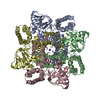


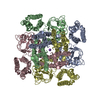
 PDBj
PDBj
